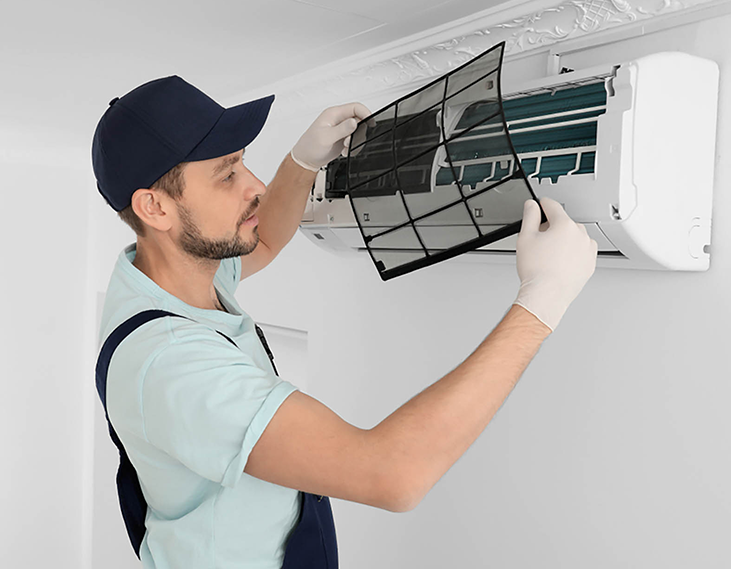
When you think about your air conditioning system, chances are your mind drifts to the sleek indoor unit or the powerful outdoor condenser that works tirelessly during the summer heat. But lurking behind your walls and ceilings is an often-overlooked hero: your ductwork. Maintaining your ducts properly is essential to ensuring your system’s long-lasting performance, consistent airflow, and overall efficiency.
An AC system, no matter how advanced, needs more than the occasional filter change to keep running smoothly. Regular, comprehensive inspections go beyond the basics and provide the necessary care for your unit’s efficiency and longevity. This blog delves into why you need thorough AC inspections, what they should cover, and how proactive maintenance benefits you in the long run.
The Hidden Key to Long-Term AC Performance
Most homeowners don’t realise that the true heart of an efficient air conditioning system lies not only in the main unit but also in the ductwork, refrigerant levels, electrical systems, and even airflow. These crucial components work together to ensure your system operates at peak performance.
So why does it matter? Imagine driving a car without a regular service check. It might run smoothly for a while, but eventually, issues will arise, and you’ll end up paying for costly repairs or worse, a breakdown. The same applies to your air conditioning system. Without regular inspections, hidden issues can quickly spiral into major problems that affect both your comfort and wallet.

The Benefits of Regular AC Inspections:
- Maximising energy efficiency – Regular checks catch leaks and blockages that could lead to increased energy consumption.
- Improved indoor air quality – Ensuring ducts are clean and sealed prevents pollutants from circulating through your home.
- Prolonged system life – Preventative care extends the lifespan of your AC unit by addressing minor issues before they become major problems.
What Does a Comprehensive AC Inspection Really Involve?
A comprehensive AC inspection is more than just a quick filter check.A thorough inspection involves carefully examining key components of your system to uncover any hidden issues and ensure the unit is operating at peak efficiency. Here’s a breakdown of the crucial tasks performed during an inspection:
Internal System Health Check
A thorough assessment of the internal components includes:
- Evaporator coils: These can accumulate dust and dirt over time, reducing cooling efficiency.
- Heat exchangers: Cracked exchangers can lead to safety hazards and reduced system performance.
- Refrigerant levels: Low refrigerant reduces cooling efficiency and strains the system.
Regular inspections ensure that these components are functioning at their best, preventing unexpected breakdowns and enhancing energy efficiency. This is why air conditioning maintenance London is essential for keeping your system in top shape..
Electrical and Control System Testing
The electrical system is crucial but often overlooked. Issues such as faulty wiring or malfunctioning sensors can cause poor performance or system failure. During inspections, we check for:
- Wiring: Loose or damaged wires can cause short circuits.
- calibration: Ensures accurate temperature regulation.
- Control board: The brain of the system, needing regular checks to ensure proper operation.
Airflow and Ductwork Assessment
Efficient airflow is essential for effective cooling. During a ductwork inspection, common issues include
- Leaky ducts: Gaps or poor connections can waste air, lowering cooling efficiency.
- Duct blockages: Dust or debris can obstruct airflow, reducing system performance.
- Poor insulation: Uninsulated ducts can waste cooled air before it reaches living spaces.
Ductwork inspections as part of air conditioning maintenance ensure that your system operates at peak efficiency, without leaks or blockages.
Outdoor Unit and Condenser Examination
The outdoor unit is exposed to the elements, making it prone to debris build-up. A proper inspection includes:
- Debris clearing: Removal of leaves or dirt from the condenser.
- Fan and coil checks: Ensuring no wear or damage.
- Refrigerant assessment: Ensuring optimal refrigerant levels for effective cooling.
A clean, well-maintained outdoor unit is essential for optimal system performance.
When Should You Book an Inspection? Timing Matters
Scheduling a comprehensive AC inspection should not be an afterthought. To maximise efficiency and prevent costly breakdowns, it’s essential to book an inspection at the right times.
Before the Summer Heat Strikes
The best time for an inspection is during the spring months, well before the summer rush. This ensures your system is running optimally before you start relying on it heavily. Waiting until it’s 30°C outside to realise your system isn’t cooling as it should can lead to frustration and emergency repairs.
After Home Air Conditioning Installation
If you’ve recently had home air conditioning installation done, an inspection in the first year is crucial. It ensures the system is operating as expected, identifies any potential installation flaws, and verifies that the system is cooling efficiently.
Unseen Problems That Are Caught Only During Inspections
Even if your air conditioning system seems to be working fine, there could be underlying issues that could cost you money in the long run. Here are some problems a comprehensive inspection can uncover:
Energy Drainage
Did you know that air conditioning systems are often responsible for a large chunk of your energy bills? Small issues, such as leaks, blockages, or inefficient coils, can cause your system to use significantly more energy than it should. According to the Department of Energy, addressing small leaks can save up to 30% in energy costs.
Inconsistent Cooling
Hot spots in your home are never pleasant, but inconsistent cooling is more common than you might realise. Airflow blockages, leaks, and system malfunctions often cause uneven temperature distribution. A thorough inspection ensures that air is circulating evenly throughout your space, keeping all rooms at the right temperature.
Real Consequences of Skipping Comprehensive AC Inspections
Ignoring regular inspections can lead to a host of problems:
- Escalating Energy Costs: An inefficient system uses more power, leading to unnecessarily high energy costs.
- Shortened system lifespan: An unmaintained AC unit deteriorates more quickly, resulting in frequent repairs and, ultimately, the need for a complete replacement.
- Emergency repairs: Neglecting maintenance increases the likelihood of sudden breakdowns, especially during peak usage times.
Here’s a simple comparison to illustrate the importance of regular inspections:

Disclaimer: Results may vary based on system condition, usage, and maintenance quality.

Why You Should Call the Pros
While DIY maintenance is important, professional technicians have the tools and expertise needed to perform a thorough inspection.They can identify hidden issues, utilise advanced diagnostic tools, and address problems before they escalate into expensive repairs.
- Expertise & Tools: Professionals have the right tools and expertise to identify hidden issues.
- Advanced Diagnostics: They use specialised equipment to detect problems before they worsen.
- Prevent Costly Repairs: Early detection helps avoid expensive repairs or system failure.
- Optimal Performance: Ensures your system runs efficiently, saving you money in the long run.
Conclusion
In conclusion, taking a proactive approach to your air conditioning system is the best way to ensure long-term performance, energy efficiency, and comfort. Comprehensive inspections are essential to catching problems early, extending the lifespan of your system, and improving the overall quality of your indoor environment.
If you want to keep your AC system running smoothly year after year, schedule regular inspections with trusted professionals like Hamilton Air Conditioning Ltd. A little preventative care goes a long way in saving you money and stress down the road.

